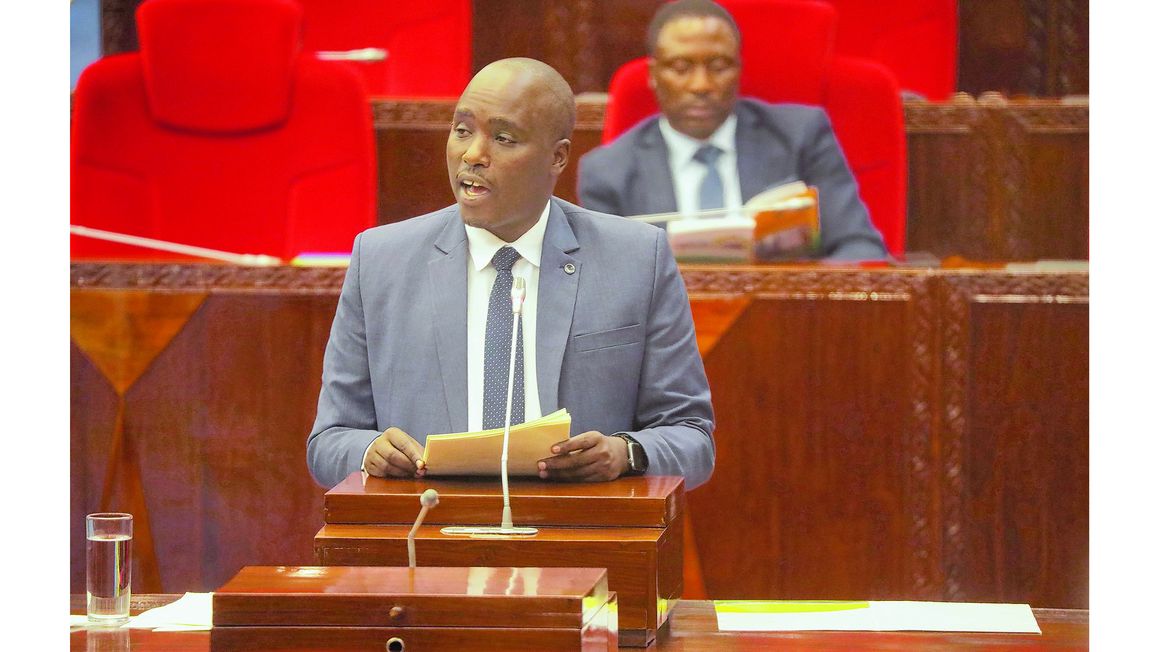
Minerals minister Dotto Biteko tables the budget estimates for his ministry in Parliament in Dodoma yesterday. He asked the august House to approve a total of Sh66.816 billion as the ministry’s budget for the next financial year. PHOTO | EDWIN MJWAHUZI
Dar es Salaam. Revenue collection from mining is projected to rise by 27.15 percent in the next
financial year as the government undertakes several major changes aimed at boosting contribution of the sector to Tanzania’s gross domestic product (GDP).Asking Parliament to approve a total of Sh66.816 billion for his ministry in the 2021/22 financial year yesterday, Minerals minister Dotto Biteko said a total of Sh696.44 billion will be from royalties and fees on mining operations in the coming year.
This will be possible as a result of the ministry’s plan to, among other things, strengthen control and management of large and medium mining operations, a move that would benefit both the country and investors as well.
According to Mr Biteko, the ministry will implement strategies that will enable the control of smuggling and illegal mining in the country.
He told Parliament that they would also reinforce the country’s mining markets, establish and strengthen the Kalema gold market, open and manage large-scale mining and place emphasis on graphite mining and other minerals. The ministry will also develop strategies to strengthen the market for tanzanite and other gemstones in the country.
“We will also ensure that all large and medium mines employ, purchase services and products from the country at reasonable rates according to availability and provide social services in the relevant areas,” Mr Biteko said.
He said among the funds to be collected, Sh650 billion equivalent to 93.33 percent will be submitted to the Treasury and Sh46.43 billion equivalent to 6.67 percent will be used by institutions under the ministry.
Apart from this, Mr Biteko disclosed that the ministry will design and strengthen the implementation of programmes to enable small-scale miners to carry out their activities productively by allocating sites and licensing them to areas whose basic geological information exists. “We will connect them with banks so that they can secure loans; provide affordable research services, develop small and medium scale miners, and provide them with the necessary training on mining, refining and mining business,” said Mr Biteko.
The minister also said the ministry would encourage mineral value addition activities in order to boost revenue collection.
“The ministry will encourage the construction of factories that use the latest technology for refining and processing of mineral products; managing and encouraging investment in value-adding activities including the construction of smelters and refineries,” he said.
Similarly, he said the ministry would promote Trade and Investment in the mining sector, capacity building for sub-institutions so that they can carry out their responsibilities effectively, manage the mining operations inspection system and develop human resources and improve the working environment.
Meanwhile, Mr Biteko recalled the contribution of the mining sector to the GDP saying it has been improving year on year due to the rapid growth of the sector compared to other economic sectors.
He said the sector’s contribution to GDP increased from 3.8 percent in 2014 to 5.2 percent in 2019.
Also, the contributions, he said, was evident during the third quarter of 2020 (January to September) rising to 6.4 percent.
“This trend of sector contribution to GDP gives us confidence to achieve the ministry’s goal of contributing 10 percent to GDP by 2025,” he believed.





No comments :
Post a Comment